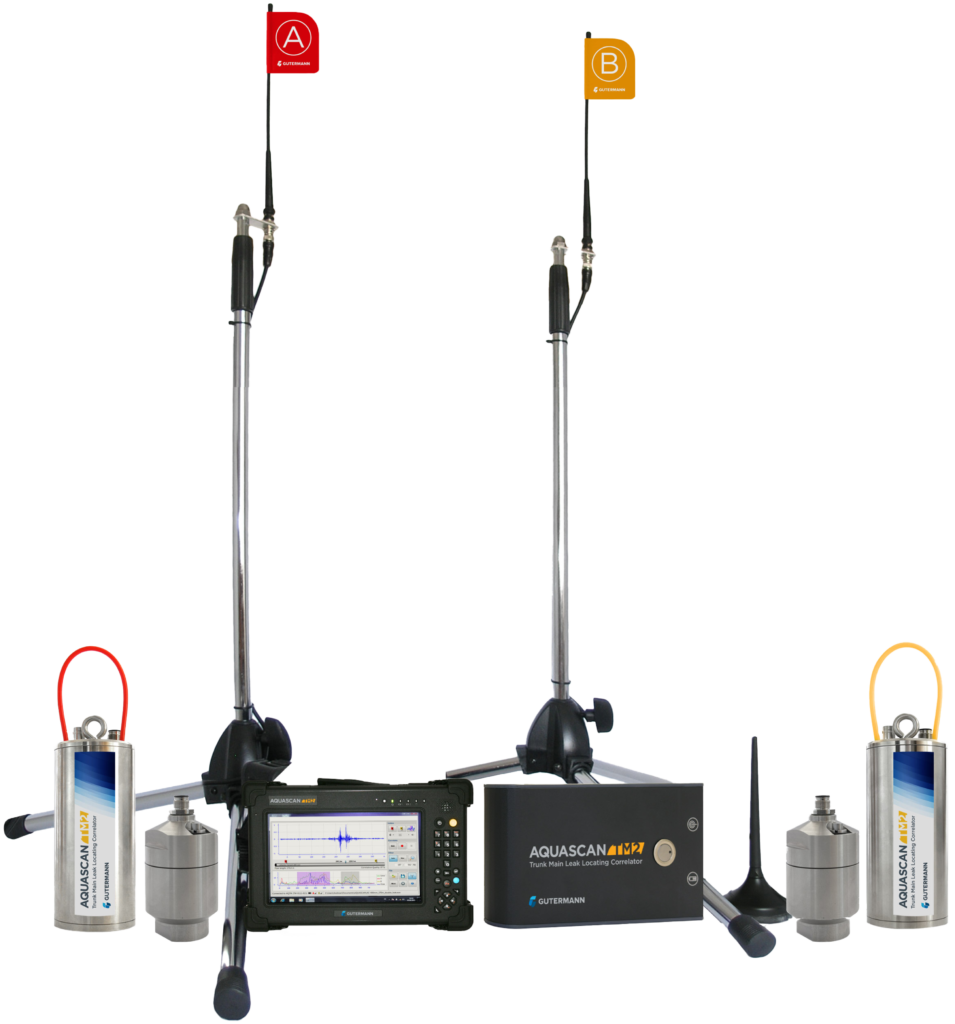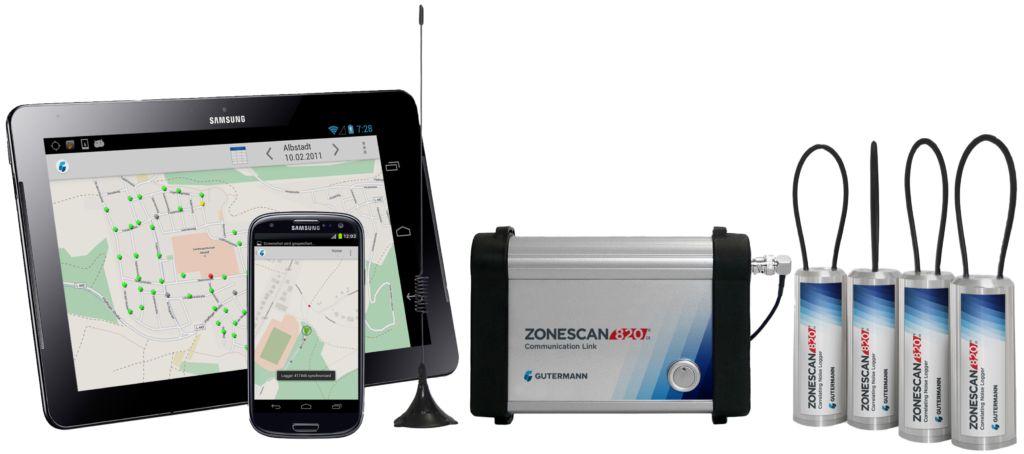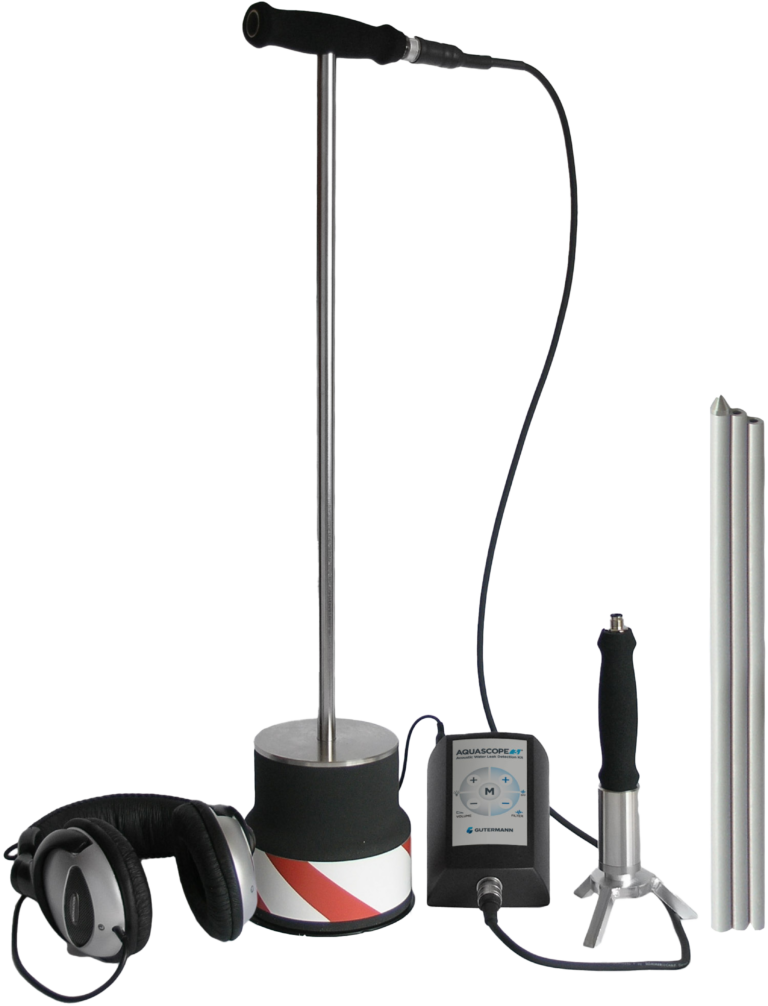GUTERMANN
Acoustic Water Leak Detection Technology
AQUASCAN TM2 Trunk Main Leak Locating Correlator
The TM2 correlator is a non-invasive, and non-destructive technology used to detect leaks in large diameter pipes (trunk mains). The TM2 system detects even quiet leak noise at low frequency and accurately pinpoints the location. The system can be used on both metallic and non-metallic pipelines and can correlate leaks over distances of up to 2000-feet. Operates using hydrophones that are attached to features such as hydrants, valves, backflow preventers, or the pipe itself if applicable. The hydrophones are placed so that they bracket the desired span of pipe to be inspected.
The technician inputs the pipeline diameter, material, distance between hydrophone information into the tablet, and runs the investigation. Feedback is immediately displayed on the tablet where the technician reviews to identify any leaks in terms of magnitude and location. The system auto-filters to rule out false positives and noise pollution and provides a confidence rating for potential leak signatures. If a leak noise is detected but confidence is low, the system allows for “spot filtering” with which the operator can click on an area of the pipe where a leak is suspected, and the correlator focuses on the noise profile of only that section of the pipe. The real-time feedback to the tablet allows for more pipe footage to be inspected in a single day. However, if there is a particular pipe segment that is suspected to have a cyclical leak (such as during a high demand period) the TM2 system can be left in place for days to ensure all conditions of the pipe are inspected.

ZONESCAN 820 Correlating Radio Loggers
The 820 loggers operate very similarly to the TM2 system, but is geared toward smaller diameter pipelines. The loggers are physically attached to features along the water pipeline throughout a pipeline system by magnetism. Valve stems, fire hydrants, backflow preventers, and hose bibs are the most common appurtenances to which the loggers are attached. The loggers record audio along the pipeline and are programmed to identify the acoustic signature associated with a leak. The technology is refined to rule out false positives or negatives, while also filtering out ambient noises. Correlation occurs when sequential loggers detect the same acoustic leak signature, at which point the precise location of the anomaly is recorded.
CPM owns 38 individual loggers providing the capability of inspecting several miles of pipeline for leaks in a single deployment. In most cases, the loggers are attached to features and left overnight to ensure any temporary or cyclical leak noise is recorded. The loggers are accompanied by a tablet which maps their deployment location making for easy collection the following day, with immediate re-deployment in new locations.

AQUASCOPE 3 Digital Acoustic Leak Locator
The simplest, yet reliable, tool that CPM operates for leak detection is a ground microphone. Ground microphone equipment is used to manually attempt to locate or verify leaks in pipelines. Acoustic microphones are used to detect and amplify the noise created by leaks in pressurized pipes, and can be used to pinpoint the exact location of suspected leaks. Generally, ground microphones are used as part of a phased approach to pipeline leak detection after specific locations have been determined with the correlating loggers. The microphone is used to validate leaks in areas indicated by the loggers but can also be used independently if other evidence suggests a leak in a specific area.
Leak detection via ground microphone is straightforward; the user outfits the unit with one of the various acoustic sensor tools (covering small to large areas), and listens for acoustic anomalies (leaks) through the attached headset. A leak is distinguished from the normal ambient noise of the pipeline by decibel readouts on the tools’ display screen as well as the experience of the user.
